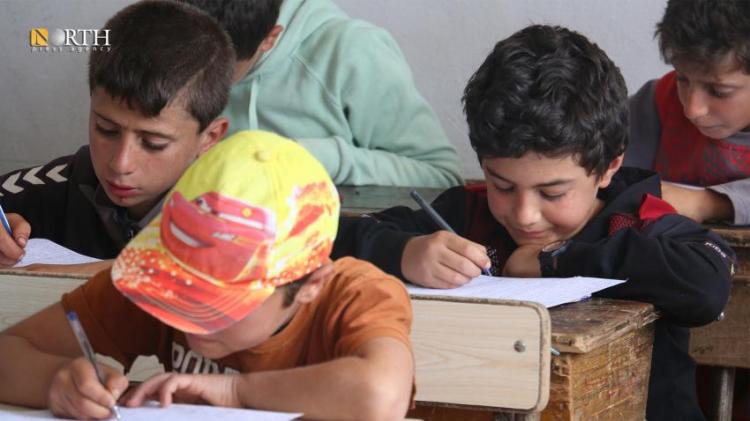
Idlib – North-Press Agency
The unstable security situation and repeated displacement has led to educational decline in Idlib, northwest Syria, amid accusations of Salvation Government neglect, in addition to the intervention of the dominant groups in the educational process.
Although there is no accurate reported number of dropouts, officials in the Response Coordinators Team (a local organization working in northwestern of Syria) mention a significant increase in the dropout rate.
Among the negative effects on the educational process in the region are the large number of teachers abstaining from teaching and searching for other work to secure their daily needs due to income inequality, cessation of educational support, the transformation of schools into refugee shelters, and the remaining schools’ inability to accommodate more students.
Unpaid teachers
Mohamed Abbas, director of the education department at Shafaq Organization (a local organization interested in relief and educational affairs in northwest Syria) said that "The teacher, who is the basis of the educational process and cannot be displaced, is facing great challenges. There are more than 4,000 who have not received their salaries in months. Their love of teaching and their hope for support had them doing volunteer work, but in the end they have families with needs.”
Abbas added that there is a great lack of "support for teachers and support for organizations or education departments. Even if support is provided, it does not provide a decent life for teachers, whose salaries are less than 120 USD. This is much less than the salary of the youngest civil society organization employee.”
The lack of support is due to the dependency of the Education Department of the Syrian Interim Government in securing teachers’ salaries on the volatile and unstable organizations’ support, according to the director.
Dissident teachers
Taher Arour, a teacher in Idlib, wrote on his Facebook account: “I announce my defection from the Teachers Union and join the beggars' one, if they accept it."
This is a reference to the bad situation that the teachers find themselves in in light of displacement, the closure of schools, lack of support, and the fact that the Salvation Government’s Education Ministry is not responsible for education and teachers.
Aleppo education director Muhammad Mustafa announced his resignation this week in protest of the reality of education and the lack of basic rights of students and teachers.
Mustafa al-Khaled, one of the teachers who quit teaching and looked for another job, told North-Press that the educational situation has become "catastrophic, and the concerned authorities must know the grave dangers surrounding our schools and the educational process."
He explained that the deteriorating situation for teachers after the stoppage of support led them to quit teaching.
"We are without salaries since last year, and organizational support does not cover the cost of our summer holiday, so how we can live without support to avoid poverty and destitution?”
Interventions and pressure
Al-Khaled talked about internal and external pressures facing the educational department. External pressures include "selectivity in distributing support provided by donors, and Syrian and Russian targeting of schools, which damaged more than 128 of them.”
As for internal pressures, al-Khaled refers to the intervention of "the dominant parties, which are constantly interfering with the educational department. As a result, education director Yassin al-Yassin resigned in Idlib about two months ago, under pressure from Hayat Tahrir Sham (HTS), after he refused to bow to their orders to introduce new courses and run security checks on teachers before their appointment. They also imposed new taxes on school activities, and collect 30% of the activity fees and 50% of the school cafeteria fees.
One of these interventions was a questionnaire in the city of Maarat Misrin, published last November, to be filled out by teachers. They were threatened with dismissal if they did not fill it out, but the Education Department demanded not to receive any unofficial questionnaire.
Attempts to solve the situation
In mid-September, the Response Coordinators Team mentioned in a statement that the suspension of support for the education departments in Idlib and Aleppo would close more than 840 schools.
In May, the Education Department launched an initiative that collects donations from teachers who have fixed salaries, to help those without them to overcome their economic situation.
A number of activists in the Syrian north also launched initiatives under the names “Do not break my pen,” “My school is my happiness,” and “My pen is my dream,” to shed light on what the educational sector is witnessing in Idlib, aiming to attract more interest from local and international organizations.
Severe lack of books
Muhammed Abbas, the education coordinator in Shafaq, pointed out the scarcity of textbooks, which are a cornerstone of education.
He said: "The lack of books embarrasses teachers and wastes time, especially for first year students, as they are most in need of new books. As there is no reason for the lack of books, the teachers used the regime courses, which contradicts the Education Department’s curriculum.”
Abd al-Karim al-Nur, an educational official with the Qabas Organization, pointed out the lack of educational means that help to communicate ideas to students more clearly, even though it is considered one of the most basic principles in the educational process.
Al-Nour gave a statistic on the educational situation – that there are 800,000 students in Idlib and the western countryside of Aleppo, while the number of schools there number approximately 1,300, covered by about 820,000 volunteer teachers, or those who still receive their salary from the Syrian Government Education Department in Hama.
He said that after the armed opposition groups took over Idlib, the educational department continued teaching from the Syrian government curriculum, except for “national education” (a subject that teaches the history of the Ba’ath party) which was canceled by a decision of the Syrian Interim Government’s Education Department.
He added that the courses have become uniform throughout Idlib and are printed in Turkey with the inserting of some entertainment and religious materials by local organizations.
